Black Church

What happens when the heart of God is broken?
What happens when, in spite of our best efforts, we are overcome by human frailty, we are assaulted by the reality of the sins of humankind, and it appears there is nothing we can do that will overcome the tragic pain of our fractured lives? Such are the questions that come upon us when we read of the tortured life of King David, the pain and agony of his personal sin, and the tragedy that befell the life of Absalom, his beloved son.

The past 12 months of violence against unarmed black bodies continues to draw national attention to the ongoing challenge of police brutality in the United States. Under the collective action call of #blacklivesmatter, activists and concerned citizens across the country challenge the ideology of white supremacy undergirding our criminal justice system and demand an end to state violence against black bodies. Yet the #blacklivesmatter movement is about more than an end to police brutality; it is call for the health, wholeness, and vitality of all black communities and a world in which black lives are no longer systemically and intentional targeted for demise. This includes an account of the physical environment in which black communities reside.
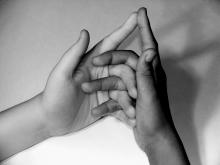
I am grieving and lamenting and beyond angry over what feels like open season on the black community/church right now in the U.S. White Christians, this is the time to pay attention and be part of our nation’s struggle to understand and address the continual violence happening against our black sisters and brothers. When one part of the Body hurts we all hurt. When one part of the Body is repeatedly targeted, killed, not protected, pulled out of swimming pools, seen as threats when unarmed – and then misrepresented, silenced, or made small through ahistoric excuses, side-stepping through political mess, or any other form of evil – we need to stand up. We need to show up – loudly. We need to demand a different response – and start with our people in the church.
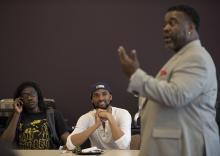
Is gay marriage a civil right like black equality? Or is it a sin African-Americans should condemn?
That’s the question at the heart of The New Black, a documentary by filmmaker Yoruba Richen that examines African-American attitudes toward LGBT people leading up to Maryland’s public referendum on gay marriage in 2012.
The film is now enjoying a new life as part of an initiative to get students at historically black colleges and universities to talk about a longtime taboo in the African-American community — sexual identity and the church.
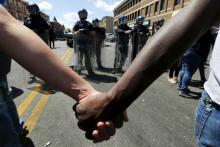
Douglas, author of the new book Stand Your Ground: Black Bodies and the Justice of God, writes about the death of Florida teen Trayvon Martin, the acquittal of George Zimmerman in his killing, and the deaths of other unarmed black people that followed.
Douglas talked about violence faced by African-Americans and the black church’s response. The interview was edited for length and clarity.
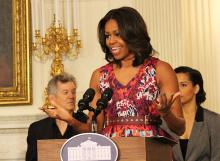
First lady Michelle Obama hosted a discussion with musicians and students on gospel music at the White House on April 14, praising gospel’s role as “a ray of hope” in American history.
“Gospel music has really played such an important role in our country’s history,” she told more than 100 students gathered in the State Dining Room, “from the spirituals sung by slaves, to the anthems that became the soundtrack of the civil rights movement, and to the hymns that millions of Americans sing every single day in churches all across the country.”
Here are some of the lessons learned during the 75-minute event, where Grammy Museum Executive Director Bob Santelli interviewed a panel of singers and songwriters ahead of a star-studded concert that will air on PBS on June 26 as part of the “In Performance at the White House” series.
1. Gospel music is personal for the first lady.
“I’m really thrilled that we’re really focusing on gospel,” Obama said of the series that has previously featured classical, country, and soul music.
“It’s something that I wanted to do since we started.”
1. Because Extreme Cold Always Brings Climate Deniers Out of the Woodwork …
Bill Nye, yep, the Science Guy, offers the media this helpful prompting: “‘Let’s not confuse or interchange climate change with global warming,’ noting that when the climate changes, ‘some places get colder.’”
2. After the Copenhagen Synagogue Shooting, This Muslim Community Is Responding in the Best Way Possible
“Islam is about protecting our brothers and sisters, regardless of which religion they belong to. Islam is about rising above hate and never sinking to the same level as the haters. Islam is about defending each other. Muslims want to show that we deeply deplore all types of hatred of Jews, and that we are there to support them.”
3. Afghan Civilian Deaths Hit Record High
2014 was the deadliest year on record for civilians in Afghanistan, according to the U.N. Total civilian casualties jumped 22 percent from 2013.
4. Ash Wednesday: To Be Seen
“… revelation does happen and ... we see. We see that we have always been seen by God. God holds us and beholds us even when it can be so hard for us to hold and behold God.”
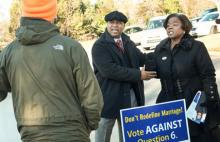
Yoruba Richen’s documentary “The New Black” airs this month online and on television through the PBS series “Independent Lens.” The film, which explores the intersection of race, religion, and sexuality, also has been screened at Chicago’s Trinity United Church of Christ and New York’s Union Theological Seminary. An African-American lesbian, Richen talked to Religion News Service about the new openness she sees in black churches around the issue of same-sex marriage.
Dr. Vincent Harding, a theologian, historian, author, and civil right activist, died at 5:11 p.m. on Monday at the age of 82. Dr. Harding worked alongside Dr. Martin Luther King Jr., as friend, speechwriter, co-collaborator, and served as a mentor and advisor to many of the members of the Student Non-violent Coordination Committee.
Harding's social activism had deep spiritual roots in the Mennonite tradition and the Black church. Dr. Harding was one of the chroniclers of the civil rights movement as a participant, an historian, and social observer. He and his late wife Rosemarie were senior consultants to the "Eyes of the Prize" documentary film project.
Harding was a professor emeritus at the Iliff School of Theology and co-founder with his wife Rosemarie Freeney Harding of the Veterans of Hope Project, at the Center for the Study of Religion and Democratic Renewal at the Iliff School of Theology in Denver. He is also the author of numerous books, including Hope and History: Why We Must Share the Story of the Movement, There is a River: The Black Struggle for Freedom in America, and Martin Luther King: The Inconvenient Hero. Harding wrote King's famous 1967 "Beyond Vietnam" speech.
Jim Wallis, president of Sojourners and a friend of Harding, released this statement in response to Harding's death:
This is a great loss for our movement and the world and for all of us here at Sojourners. Vincent loved and served us so often in our history. He was an elder and mentor to me and to many of us. I am so grateful for a life so well lived. Thanks be to God for Vincent Harding. We are poorer for his passing and richer for having known him.
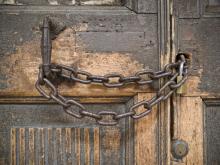
Over the past week, as the nation has wrestled with the implications of the “not guilty” verdict in the George Zimmerman trial, I have concluded that many in white America are desperately trying to remind African Americans that, when it comes to race in America, silence is golden. Their effort implies that any honest dialogue about race that includes the stories and experiences of African Americans disturbs the idea of the “American experience” for those of a lighter hue.
This message came through loud and clear last Friday following President Obama’s unexpected and personal reflection on the death of Trayvon Martin and the verdict on the trial of George Zimmerman.
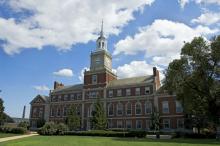
For many pundits and observers, last week’s election proved that a “new normal” has emerged in America: record numbers of women and ethnic minorities were voted into the House and the Senate, and the House will also see its first Hindu representative in January. Voters in Maine and Maryland approved same-sex marriage, and a diverse coalition of social minorities came together to re-elect the nation's first black president.
But for black theologians, the election has also been an occasion to reflect on how the black church faces an identity crisis, losing track of its mission to lead the way in issues of justice and liberation.
“Something happened to the black church after the assassination of Martin Luther King, Jr., in 1968,” said Dr. Gayraud Wilmore, one of the founders of black theology, adding that when King died, it seemed that in black congregations, the enthusiasm for black history and racial identity also died.
And for Wilmore, the last 44 years — even the election and re-election of a black president — have done little to abate this crisis.
RALEIGH, N.C. -- With only a few days remaining before North Carolinians vote on a state constitutional amendment to ban same-sex marriage, the Rev. Earl C. Johnson took five minutes on Sunday (April 30) to give congregants 10 reasons to vote against the measure.
It was his only concerted effort to wade into a subject considered taboo in most African-American churches: homosexuality. Not wanting to risk his job as senior pastor of Martin Street Baptist Church, or upset his many older congregants, Johnson figured the best approach was to stick to the facts.
The state already forbids gay marriage, he told church members. The state's top Democrats, including the governor, oppose the measure. The constitutional amendment might strip unmarried heterosexual women of domestic violence protections.
None of the points he outlined touched on the central issue: how the church might respond to gays and lesbians.
"It's a traditional church," said Johnson. "When you get to be a certain age you don't budge on your point of view. It would take years of chipping away at it to change it."

Policy-Making Billionaires, Poverty In The Midst Of Plenty: Hunger Persists In The United States; The Religion Of An Increasingly Godless America (OPINION); Evangelicals Flocking Toward Newt Gingrich; Rev. Jackson Calls For New War On Poverty; Improving Social Justice Indicators Will Create A Better U.S. (OPINION); Is The Black Church The Answer To Liberal Prayers?; Catholic Charities' Human Trafficking Program Loses Federal Funds; Air Force Academy Adapts to Pagans, Druids, Witches and Wiccans.
If justice is only an implication, it can easily become optional and, especially in privileged churches, non-existent. In the New Testament, conversion happens in two movements: Repentance and following. Belief and obedience. Salvation and justice. Faith and discipleship.
Atonement-only theology and its churches are in most serious jeopardy of missing the vision of justice at the heart of the kingdom of God. The atonement-only gospel is simply too small, too narrow, too bifurcated, and ultimately too private.
[Read more of this blog conversation in response to the Sojourners magazine article "
Glenn Beck says Christians should leave churches that use the word "social justice." He says social justice is a code word for communism and Nazism.